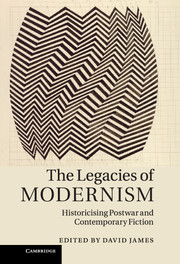Book contents
- Frontmatter
- Contents
- Notes on contributors
- Acknowledgements
- Introduction: mapping modernist continuities
- Part I Early legacies: inheriting modernism at mid century and beyond
- Part II Modernist aesthetics in transition: character, perception, innovation
- Part III Reassessing the ethics of modernist fiction
- Part IV Modernism's global afterlives
- Chapter 11 Fictions of global crisis
- Chapter 12 Representing slums and home: Chris Abani's GraceLand
- Chapter 13 For translation: Virginia Woolf, J. M. Coetzee and transnational comparison
- Epilogue Finding the dreadfully real
- Index
- References
Chapter 12 - Representing slums and home: Chris Abani's GraceLand
from Part IV - Modernism's global afterlives
Published online by Cambridge University Press: 05 November 2011
- Frontmatter
- Contents
- Notes on contributors
- Acknowledgements
- Introduction: mapping modernist continuities
- Part I Early legacies: inheriting modernism at mid century and beyond
- Part II Modernist aesthetics in transition: character, perception, innovation
- Part III Reassessing the ethics of modernist fiction
- Part IV Modernism's global afterlives
- Chapter 11 Fictions of global crisis
- Chapter 12 Representing slums and home: Chris Abani's GraceLand
- Chapter 13 For translation: Virginia Woolf, J. M. Coetzee and transnational comparison
- Epilogue Finding the dreadfully real
- Index
- References
Summary
I
My chapter begins by challenging a premise modernist studies holds dear, that modernism is better suited than realism to elucidating the complexities and relations of power under colonialism, and, therefore, that it also articulates the challenges of the postcolonial condition. Certainly English modernists such as Virginia Woolf and E. M. Forster understood themselves to be more insightful than their Victorian predecessors. They were not imperialist or sexually conservative, after all. This argument depends on something I will outline only briefly. In reading for form we see that postcolonial studies, including African literary criticism, has a history of anxiety about having to defend its literature from being treated as ethnography. One result is that postcolonial literary criticism has ridden on the modernist coat-tails of rejecting realism. In critical–theoretical terms, we might call this ‘the Barthes effect’ of poststructuralism, as worked out in Anglophone literature by Stephen Heath and Colin MacCabe, and popularised by Catherine Belsey at the moment when French theory first made a big impact in Britain and the United States. Scholars of postcolonial studies have allowed themselves to be enveloped by the mantle of Woolf's claim, buttressed decades later by Belsey, that Woolf's style transcends the mere detail, the deadening list of facts and information. The narrative mode of modernism gets represented as not only more formally innovative but inherently more politically progressive than realism.
In ‘Mr. Bennett and Mrs. Brown’ (1924), Woolf makes a strong argument that by attending to the inanimate objects around her house, Arnold Bennett never allows the eponymous character of Hilda Lessways to emerge, instead, lingering too long on income, the costs of housing and food, etc. In the quotation below, Woolf effects a transformation, substituting the ephemeral and infinitely interesting Mrs Brown, the character our writer struggles to convey, for the flatness of Hilda, forever condemned to representation exclusively through the house she lives in and the neighbourhood she inhabits:
But we cannot hear her mother's voice, or Hilda's voice; we can only hear Mr. Bennett's voice telling us facts about rents and freeholds and copyholds and fines. . . . They have looked powerfully, searchingly, and sympathetically out of the window; at factories, at Utopias, even at the decoration and upholstery of the carriage, but never at her [Mrs. Brown], never at life, never at human nature.
- Type
- Chapter
- Information
- The Legacies of ModernismHistoricising Postwar and Contemporary Fiction, pp. 225 - 242Publisher: Cambridge University PressPrint publication year: 2011
References
- 2
- Cited by



